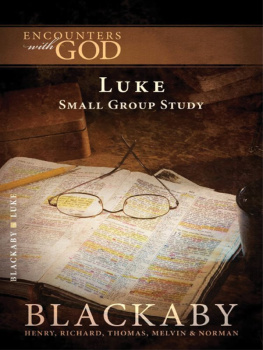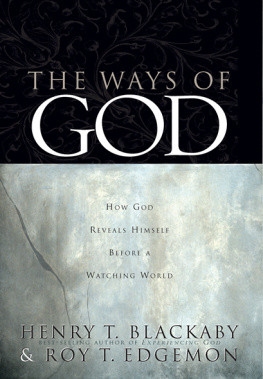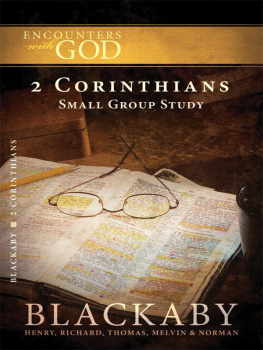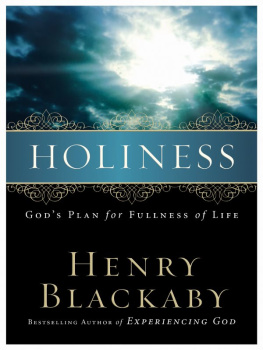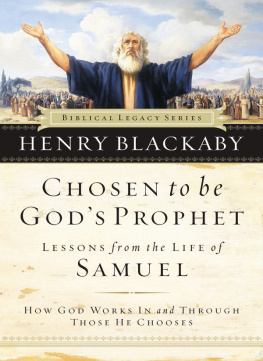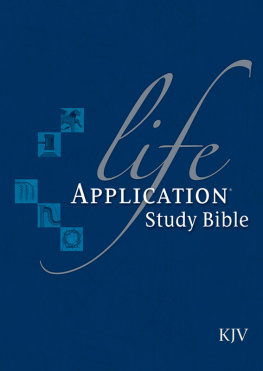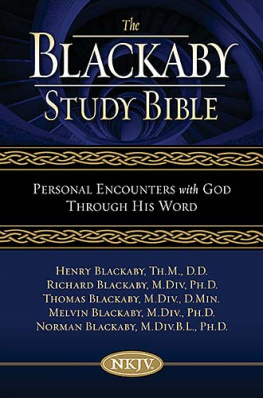Encounters with God
The Gospel of LUKE
Encounters with God Study Guide Series
The Gospel of Matthew
The Gospel of Mark
The Gospel of Luke
The Gospel of John
The Book of Acts
The Book of Romans
The First Epistle of Paul the Apostle to the Corinthians
The Second Epistle of Paul the Apostle to the Corinthians
The Epistle of Paul the Apostle to the Galatians
The Epistle of Paul the Apostle to the Ephesians
The Epistle of Paul the Apostle to the Philippians
The Epistles of Paul the Apostle to the Colossians and Philemon
The First and Second Epistles of Paul the Apostle to the Thessalonians
The First and Second Epistles of Paul the Apostle to Timothy and Titus
The Epistle of Paul the Apostle to the Hebrews
The Epistle of James
The First and Second Epistles of Peter
The First, Second, and Third Epistles of John and Jude
The Revelation of Jesus Christ
Encounters with God
The Gospel of LUKE
Copyright 2007 by
Henry Blackaby, Th.M., D.D.
Richard Blackaby, M.Div., Ph.D.
Thomas Blackaby, M.Div., D.Min.
Melvin Blackaby, M.Div., Ph.D.
Norman Blackaby, M.Div., B.L., Ph.D.
All rights reserved. No portion of this book may be reproduced, stored in a retrieval system, or transmitted in any form or by any meanselectronic, mechanical, photocopy, recording, scanning, or otherexcept for brief quotations in critical reviews or articles, without the prior written permission of the publisher.
Published in Nashville, Tennessee, by Thomas Nelson. Thomas Nelson is a registered trademark of Thomas Nelson, Inc.
Thomas Nelson, Inc. titles may be purchased in bulk for educational, business, fund-raising, or sales promotional use. For information, please e-mail SpecialMarkets@ThomasNelson.com.
All Scripture quotations are taken from THE NEW KING JAMES VERSION. 1982 by Thomas Nelson, Inc. Used by permission. All rights reserved.
ISBN 978-1-4185-2640-5
Printed in the United States of America
07 08 09 10 11 RRD 5 4 3 2 1
CONTENTS
The Lessons:
AN INTRODUCTION TO THE
GOSPEL OF LUKE
T he Gospel of Luke is the third book of the New Testament. It is the only Gospel account addressed to a specific individual, identified as Theophilus in the third verse of the book. The book is a narrative based upon eyewitnesses to the life and ministry of Jesus. It is the first of two books Luke wrotethe second and sequel is the Book of the Acts of the Apostles.
A Gospel Account. Luke is a Gospel accountone of four books in the New Testament labeled Gospels. It joins Matthew, Mark, and John as a book that is all about Jesuswhat He did, what He said, and who He was and is. The word gospel literally means good news. The good news for Luke was that Jesus came to bring redemption to all peoplenot just the Jews, and not just to one segment of society.
Theophilus is addressed as most excellent (Luke 1:3), a term generally reserved for Roman officials. He is clearly a Gentile, with a Gentile name. His name in the Greek language literally means lover of God, and Luke may have been writing to all Gentile believers or to a particular community. Either way, the Gospel of Luke is aimed at confirming with certainty the truth about Jesusthat He is the Savior of all (Luke 1:4). Individuals from all ethnic and socioeconomic groups, both men and women, can find salvation in Him.
A Synoptic Gospel. Luke is one of the three synoptic Gospels, along with Matthew and Mark. The word synoptic means seeing from one viewpoint or one overview. Luke, Matthew, and Mark cover many of the same incidents and messages of Jesus in their Gospel accounts. In many ways, their accounts are similar to three photograph albums taken by three different photographers covering essentially the same life and events. Just as each photographer has a unique vantage point, angle, and composition, so each of the synoptic Gospels has a distinct voice, style, and purpose. Each Gospel, however, has a tone, pace, and emphasis that is unique.
Perhaps the foremost word to describe the Gospel of Luke is compassion. Luke overflows with gracious and lovely expressions of grace. It has been called the most beautiful book in the Bible.
The Gospel of Luke presents a selective history of Jesus life, for the purpose of conveying a theological message: God offers salvation to all who will accept Christ Jesus as their Savior. Samaritans, Gentiles, publicans, sinners, and those shunned by society are offered redemption by God through Christ. Luke draws attention to Christs mercy toward the outcasts, the vulnerable, and the despised. Gods nature is revealed as compassionate, gentle, and caringnot wanting anyone to perish in their sin, but rather, inviting all to experience the abundant life He intends for them to have. Jesus deals lovingly with children, women, the diseased, those trapped in sin, and those who are considered by many to be beyond redemption.
Many Bible historians and scholars believe Luke was writing to encourage Gentile believers who may have had questions about the Jewish origins of the faith, or who may have desired confirmation that they were totally acceptable to God. Luke may also have been writing to confirm to Roman authorities that Christianity posed no political threat to Rome, but rather, was a force for love and peace in Roman society. At the time Luke wrote his Gospel, there does not appear to have been a Gospel account circulating widely among the Gentile churches. (Mark was written specifically for the church in Rome; Matthew was written for Jewish believers.) Luke wrote his Gospel to provide a full and accurate record about all that Jesus began both to do and to teach until the day he was taken up to heaven (Acts 1:12).
Among the prominent themes or concepts in the Gospel of Luke are the Kingdom of God, the Holy Spirit, and prayer.
The Gospel of Luke is the longest book in the New Testament. The bulk of the narrative is devoted to Jesus miracles and parables. Some of the best-known and most-loved stories and parables of Jesus are found in Luke. It is a book filled with joy!
Luke the Author. Although Luke never identifies himself as the author of this book, church tradition from the earliest days identifies him as the author. Luke, short for Lucanus, was the physician and traveling companion of the apostle Paul (Philemon 1:24 and 2 Timothy 4:11). Paul refers to Luke as beloved, indicating the closeness of their relationship (See Colossians 4:14.). Luke is clearly aware of Jewish traditions and customs, and he may have been a Jew, although most believe he was a Gentile convert.
Many Bible scholars believe Luke interviewed eyewitnesses to the life and ministry of Jesus as he traveled with Paul, and that he especially set out to document the life of Jesus during the time Paul was imprisoned in Caesarea and Rome, perhaps hoping his account would aid Paul in his defense.
As a physician, Luke writes in an orderly, almost scientific manner, at the same time demonstrating a special interest in Jesus healing miracles.
AN OVERVIEW OF OUR STUDY
OF THE GOSPEL OF LUKE
T his study guide presents seven lessons drawn from the Gospel of Luke. The study guide elaborates on the commentary included in the Blackaby Study Bible:
Lesson #1: God Works through Ordinary Lives
Lesson #2: Jesus Calls Ordinary People to Follow Him
Lesson #3: Jesus Heals and Delivered All Who Came to Him
Lesson #4: Jesus Has Compassion on Sinners and Outcasts
Lesson #5: Jesus Emphasizes Love and Forgiveness to All
Next page
